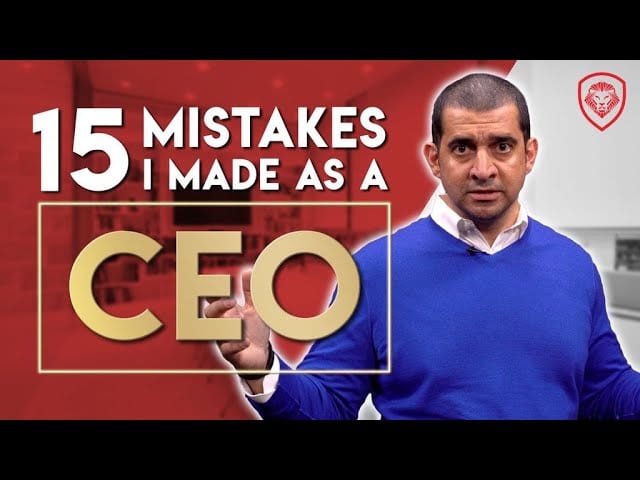15 Mistakes I Made as a CEO
I want to talk to about the 15 mistakes I made as a CEO that could save you millions of dollars. A lot of it has to do with what phase you are in as a CEO. You could be in a startup and you never been a CEO before. Maybe you’ve been a CEO for about five years, but you plateaued. You were a CEO for 10 years and you feel good about your philosophies. Maybe you shadowed under somebody else while you were a CFO, CMO, or CTO and you are about to get promoted to CEO. Now you’re trying to figure out some areas, blind spots that you may have. I want to share 15 of mistakes I made, there are a lot more out there, but these are crucial to understand.
1. Not understanding the pendulum of decision-making process
When you’re first getting started, you must touch 100% of your decisions because you’re the only employee. You don’t have a lot of other people. When you hire five employees, maybe that 100% of decisions decreases to 90%, 80%, or 70% of the decisions. The goal is to eventually get to 10% of the decisions. If you can pass off everything but 10%, it means you have built the right number of leaders around you and they’re taking responsibility for the other 90%.
Some people like to make decisions on everything. If you do this, you’re not really building leaders and the leaders you are fostering don’t like the lack of trust you show in them. You also don’t want to go too extreme with delegating and let go of all the decisions. That can ruin your vision and goals. I made this mistake multiple times. You need to figure out what falls you’re your 10% once you reach that phase of your career. It could be with contracting, negotiations, relationship with vendors, etc. Your goal is to get there and once you do, never release all the decision-making power. Know what decision you must be a part of.
2. Just focusing on the positive
You don’t want to talk about the negatives with your executive team or your leadership – it’s always positive, positive, positive. Because it’s positive thinking, wrong! Positive thinking may be good for somebody that’s in sales or somebody that’s an independent contractor. A big part of your job as a CEO is to take the negatives off other people and shoulder them all. You must talk about the potential and real crises facing your business.
Not everything can be positive all the time because it’s not real, it’s fake. Your people can see a level of fear and insecurity in you if you hide everything. You must talk about the problems that are out there. Everyone knows the problem exists so don’t lie to them. Your team will have so much respect for you because you are honest and realistic.
3. Hiring people you like
So many times, people only hire people they like. This will not only cost you a lot of money, it’ll end up hurting relationships you have with other employees, leaders, and your relationships outside of your business. If you only hire people you like everybody else is going to notice you favoring them. You will drive talent away. You will not build a team around you that can competently take 90% of the decision-making power off your plate. People we like are not always the right fit for the role. You must make an honest assessment on who you are hiring regardless of the position.
4. Don’t compromise the non-negotiable
When you’re dating, there are going to be a few things that you are not willing to compromise on no matter what. Even if you have a lot of chemistry together, there are a few things you will not compromise on. Everybody in the world of business has some points they are not willing to compromise on.
These nonnegotiable could come from your operating standards, life experiences or expectations for your business. It doesn’t matter where you draw from if you give in once, and compromise your nonnegotiable, you will have to explain why to everybody. You will lose trust, influence, and you will not be seen as someone with conviction. So do not compromise your nonnegotiable, you know exactly what those things are. Don’t compromise.
5. Second guessing yourself in areas you’re an expert in
I second guessed myself multiple times throughout my career. But look at the sentence and how I ended it – in areas you’re an expert in. That is key to this point.
There are areas that I’m not an expert in. If I’m second guessing myself in areas, I don’t know a lot about, I like to bring a pool of people and together we make a decision. It provides me with a perspective I would not have access to because I am not an expert. But there are areas you are an expert, and, in those areas, no one knows more than you do. Do not second guess yourself in those specific areas.
Back during my fifth year as a CEO, we’re going through an interesting and challenging time. A couple of guys that work with me made me second guess myself for about an eighteen-month period. During that eighteen-month period we grew 15-20% instead of what we should have been doing which was growing at a 75% or 100% rate.
I said, no more second guessing! This is who PBD is in these areas, I know what I’m doing. I know what I’m an expert in. I’m not negotiating. In all the other areas, I’ll get other people’s feedback. You are an expert in your area. Trust your expertise.
6. Speed of decision-making process
There are some decisions you make a move on right away and there are some decisions that take a little longer. There was a decision I had to make that affected every department and when I went over my decision in my head I realized, I was not fully ready. In my mind, I was 90% there, but I wasn’t 100% and it was a very big decision. I noticed every department was kind of not moving swiftly because everybody was waiting on me. This lasted three weeks. Eventually I made my decision publicly to everyone in the company and they thanked me for taking my time with it. They understood the pressure this decision brought with it, but they let me know how they were waiting on direction from the top, me.
I learned that it is okay to take some time when it is a big decision. But you need to remember your decisions will not only affect you, they will touch so many different departments. While you are mulling it over, they’re just waiting on you to make a decision. Depending on what the decision is, the timeline can hurt everybody in your organization.
7. Taking your eye off the money
Early on in my career, I was hustling to get everything going with the company. Then one day I come in and my director of finance says, “Hey, I just want to show you the business checking account.”
I said, “Really?”
She said, “Yes, I think you need to know this.” We looked at it and the account was very low. Like pay attention now, low. I took a moment, made a list of everything we had to do and everything we needed to cut. It’s easy to lose sight of money because you’re not paid in sales. But sales are what drive revenue back up. We had to lean on sales to get back on solid ground and change a lot of behaviors. From then on, I paid attention to the money because we had to. Nobody should care more about money in a company than you as a CEO. Not the CFO, CMO, CEO, nobody.
8. Having counsel outside of your board meeting
When you build a business, typically you have a board as well, right? This board gives you advice on what to do, it establishes governance and all this stuff. As the CEO, you are asking for their feedback and sometimes the board wants you to take their feedback and put it into action. It’s very weird dynamic. People don’t mind you asking feedback, but doing it too frequently makes them feel like you don’t know if you’re leading an organization in the right direction. So, as you’re dealing with board, ask questions, take feedback, but you also must have an outside board giving you counsel.
Your personal board should provide you with feedback on your personal life, your marriage, your finances, your health, and together you all process what’s going on. You can take some business concerns to them as well if they are made up of mentors and leaders who know you and your industry. They exist so you can have a fresh perspective. My recommendation is to get a board outside of your existing board that can provide direction, but at the same time you’ve got to be assertive, so they know you’re leading.
9. Favoring people
Favoring people is very similar to hiring people you’ll like. You’ll have certain people that you favor. The moment favoritism takes place in an organization, you will lose trust. I was in an environment where I’ve realized, I have somebody that I liked, and I wouldn’t fire. Everybody started saying, “Pat, we know you favor them but it’s just not working out.” Finally, I had to sit down with them and direct them into a career. She got excited about the possibility and chose to leave. It was mutual.
What’s the moral of the story here? Once I made that adjustment, I made it very clear, even people that I have a relationship with or a friendship with, if they align with our goals we can move forward but we do not favor them because of previous relationships. You must be respectful and diplomatic. This is not being a jerk about it, but people then started realizing you don’t favor people. Trust goes up because you’re going to treat people fairly, not equally because some of you guys are more important than others, but at least you’re going to be fair.
10. Knowing who to take counsel from and who not to
This is very critical. Everybody is going to give you advice. What advice you should take and put into action is based on credibility. A lot of people are not going to agree with this idea. If you go read Huffington Post, or Fortune magazine or Money magazine, they say things like, you must be willing to hear everybody. Wrong! If you want to build a big organization, you shouldn’t be taking advice from somebody that’s never made more than $45,000 a year. I started looking at who was given the advice and what was their credibility. What was their expertise? What was their background? How long have you been here, and do you know the culture? Then I’m willing to take counsel from you.
There are a lot of consultants asking for $20,000 to identify and fix your problems for you. If you’re so good at solving my problems, why are you a consultant and not running a company? If you’re such an expert, why did you become a consultant the first place? Running a business is not easy. Business as a completely different ballgame and you have to understand who to take advice from and who not to take advice from based on where they’re at. Again, not a lot of people are going to agree with this, but I’m giving you the mistakes I made so you can learn about yourself and the different phases ahead of you.
11. Not studying data
Data is very important, and you must not forget to study as much data as you can. Some people study way too much, and they forget about the emotional side of humans.
For instance, I was having a conference call earlier this morning, and one of our executives sounded defeated because he reported some of his worst ever numbers. Instead of just going through number by number telling him what he already knows, I took completely different approach. I told him that his office, that has about sixty people that all work for him, can see, feel and understand the loss he feels right now. Everybody can feel the energy he is giving off. It’s felt by his support team, customer service, sales, everybody. I said, you just got to pick yourself up. How many times have I told you how much I respect you for your character, your values, and who you are as a human being? You lost. But now you must use that and change your attitude. Go take a cold shower. Make a list of 20 things that makes you special as a human being. Remind yourself who you are and then go share it with your people. They need to hear from you.
Going back to the point, not studying data. You got to look at your numbers and measure all of them. There is specific to data you need to be on top of for your industry and your business, but you must study all your numbers. Measure everything to everything – season to season, quarter to quarter, month to month, week to week, day to day. You will learn so much about the trends of your business.
12. Avoid hiring resume builders
There is a trap that a lot of businesses fall for of “Why don’t we hire people and train them here for office support?” Sales is different. I want green when it comes to sales because I don’t want someone with 20 years of experience acting like they know everything about sales. I’m talking Home Office support. Young talent that is only coming here and staying so they can shop themselves around somewhere else. They turn their employment into what can you offer me? They can offer me this can you match that or make it better? If you can’t, they are gone while you are stuck finding the right linchpin for this role.
So, here’s what I recommend you do, hire people just to help you out in areas that you’re not an expert in until you can avoid those resume builders entirely. You need to find the experts that will cost a little more but will establish a reputation in your company and in your industry that these resume builders are not going to be a good fit. Rather than getting maybe a 24-year-old, get a 36-year-old career wife, with kids and a husband who wants stability.
13. A comp plan that doesn’t produce the results you want
I give advice to other companies and CEO’s and they want to know what they need to do to drive their organization? The first thing I ask for is their comp plan and you would not believe the number of organizations that don’t have one or their existing plan is lacking any incentive for growth. Tweaking their comp plan does the trick every time. I’ve probably changing my comp plan probably a hundred times. You know why? I was trying to find what produced the results I wanted. Sometimes your comp plan could be the reason that some people are breaking the rules you established or worse breaking laws. You got to have a comp plan that produces exactly what you want from your employees, your staff, your support, your executives, and your salespeople.
14. Experienced talent equals money
Don’t be cheap if you want to get the right kind of talent. If you want to get some legitimate, quality people you must pay for them. You can’t train everybody up to what you need. Normally people hire for right now. Eventually, when you get to that phase of building your empire, you should be hiring for a year from now. You’re not hiring just for a month.
Hiring should not devolve into we need this person today and then we need another person next week. That’s crisis hiring. If you are doing that, you’re not hiring for 12 months. It should be like when you get a lease. You don’t get an office space for what you need now, you get an office space for what you need 12 months from now, 18 months from now. We’ve got a big office space here. Its nearly 30,000 square feet and guess what? We’re trying to get the space next door to give us another 15-20,000 square feet because we will grow in it.
15. Micromanaging too late
You’ll read these books, articles, they’ll make you feel guilty about micromanaging. They will tell you not to micromanage. A real leader doesn’t need to micromanage. But six months later, after you break too many different things, then you start getting micromanaged. By that time the person is not used to you working with them that way and it causes more issues. What you can do instead is you can micromanage upfront and that person let go later. By then you trust them to make the right decisions because you micromanaged them early on. If you don’t micromanage, if you don’t hold people accountable, don’t expect people to make deadlines, or numbers, or produce the results you want.
There are two videos I want you to watch. The first is 19 Qualities of a Great CEO, and the other is Seven Audiences Every CEO Has. The second video is one of my favorite videos because when you’re communicating with different audiences, you can’t speak the same way and I had to learn this the hard way.
Visit the official Valuetainment Store for gear
About Valuetainment:
Founded in 2012 by Patrick Bet-David, our goal is to impact entrepreneurs around the world through value and entertainment. We are the #1 channel for entrepreneurs because of the best interviews, best how to videos, best case studies and because we defend capitalism and educate entrepreneurs.
To reach the Valuetainment team you can email: marketing@patrickbetdavid.com
Follow Patrick on social media:










